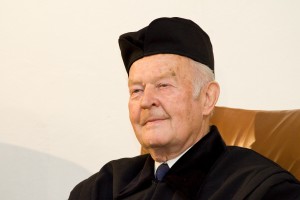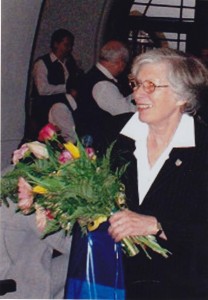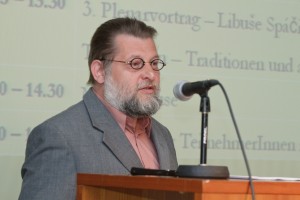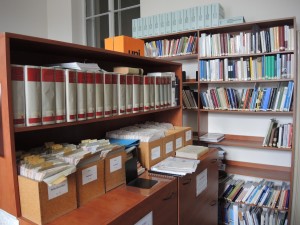In past centuries there has been a great amount of German written literature in the Czech lands. It was not only the renowned German literature from Prague which is well established in literary history. German literature from Moravia also had something to offer: It is connected with names such as Charles Sealsfield, Marie von Ebner-Eschenbach, Jakob Julius David, Robert Musil, Ernst Weiß, Hermann Ungar, Hugo Sonnenschein, Walter von Molo, Edmund Husserl, Ludwig Wittgenstein, Adolf Loos, Gustav Mahler, Leo Fall, Alfred Brendel, etc.
Since 1945 the existence of German literature from Bohemia, Moravia and Silesia was not (except for a few isolated cases) mentioned or popularized. The research of German literature was hiding in the corner, beyond the attention of the public, schools and media. The Czech socialistic historiography tried to push out of the public notion even faint memories of the German element as a part of Czech history, culture and literature. The position of the narrow-minded Czech anti-Germanism, encouraged by the backward political regime, luckily has been overcome and the part that intellectuals speaking and writing in German play in Czech culture is not a forbidden topic anymore.

Ludvík Václavek
In 1998 the scholarly institution, the Research Centre for German Moravian Literature, was founded at the Department of German Studies at the Philosophical Faculty of Palacký University in Olomouc by Ludvík Václavek, Lucy Topoľská and their colleagues Ingeborg Fialová and Jörg Krappmann who come from a younger generation of scholars. Its general goal is to explore literature from Moravia written in German. With respect to the history of lands of the Bohemian Crown a research with such focus is completely logical: To 1945 Moravia belonged to territories with largely polynational and polyethnic culture.

Lucy Topoľská
The founders of the Research Centre for German Moravian Literature had a tradition to continue: In the time of normalization in Czechoslovakia the local literary theoreticians Ludvík Václavek, Lucy Topoľská and others (the same as their colleagues from Brno and Prague) were partially or completely isolated from the European research in the field, its topics and trends and had only limited or no possibility to publish. Because they were prohibited to deal with the “big topics” for politic reasons, the literary historians devoted their research to the area that was logically offering itself: literature written in German from Bohemia, Moravia and Silesia. They have collected an abundance of information and facts that call to be evaluated, processed and published.

Ingeborg Fialová
The founding of the Research Centre for German Moravian Literature served as an official institutional frame for these activities and made it possible for undergraduate and postgraduate students of the Department of German Studies to become a part of this exciting process of discovery. This way the university centre carries the two functions that are expected in the academic sphere: It combines academic research with education. In the Research Centre for German Moravian Literature an extensive team of researchers was formed of established world renowned scholars and novices of literary theory, young graduates of the PhD program and students of the same. Such a composition of the research team guarantees the transfer of practical experience in scholarly work: For students of the Bachelor’s and Master’s program the work at the Research Centre represents the first encounter with research work and usage of different sources, i.e. with methods common in similar academic institutions. Under the patronage of the Research Centre the students and graduates publish their first writing. By doing this the Research Centre for German Moravian Literature provides high dynamics and effectivity of academic work and thus fulfills Nietzsche’s idea of “the gay science”.

Jörg Krappmann
Fruit of the tireless work of a group of scholars has been harvested after a few years of existence of the Research Centre: The database of German Moravian authors which contained approximately 200 names in the founding year of the Research Centre, has since grown considerably and currently contains up to 2000 names of authors related to Moravia. The culmination of this collection work was the publication of two volumes of The Lexicon of German Moravian Authors (Lexikon deutschmährischer Autoren) in 2003 and 2006. This lexicon is designed as a work in progress and draws from the rich and ever growing archive of the Research Centre for German Moravian Literature. The archive is partially available in electronic form and by agreement accessible to the public at large.
The Research Centre does not only focus on research and archival work. Together with the Department of German Studies it organizes conferences and forums dealing with topics from the field of German literature from Moravia and Bohemia, regional culture and similar topics. During the short period of its existence it has (co-)organized about twenty such meetings with the attendance of experts on regional literature from Czech Republic and abroad. These gatherings significantly contribute to the contextualization of results from the primary research. The outcome of the scholarly meetings and the results of postgraduate students’ work are presented as a series of volumes that are published under the guardianship and in cooperation with the Research Centre for German Moravian Literature.

Arbeitsstelle
Apart from academic research work, the Research Centre reaches out to the wide public which still has a distorted or an incomplete idea about the German history of Czech lands. To fill-in or reform the public notion the Research Centre organizes exhibitions, author readings, and public discussions. Further it cooperates with local radio, initiates translations of interesting texts into Czech or publishes popular scientific volumes.
The activities and results of the Research Centre for German Moravian Literature draw attention to the multi-layered character and diversity of cultural history of central Europe regardless of politically or historically based prejudice. This way the German and Czech public have the chance to revise the historical image of our countries.
